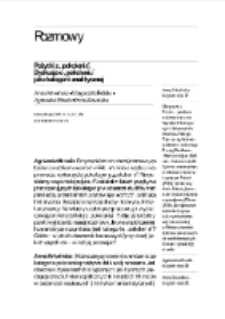
Obiekt
Tytuł: Pożytki z "pokolenia". Dyskusja o "pokoleniu" jako kategorii analitycznej
Twórca:
Artwińska, Anna ; Fidelis, Małgorzata ; Mrozik, Agnieszka ; Zawadzka, Anna
Data wydania/powstania:
Typ zasobu:
Inny tytuł:
Wydawca:
Miejsce wydania:
Opis:
21 cm ; Tekst pol., streszcz. ang.
Typ obiektu:
Bibliografia:
1. S. Aleksijewicz, Czasy secondhand. Koniec czerwonego człowieka, przeł. J. Czech, Wydawnictwo Czarne, Wołowiec 2014.
2. L. Burska, Awangarda i inne złudzenia. O pokoleniu ’68 w Polsce, słowo/obraz terytoria, Gdańsk 2012.
3. S. Buryła, Żydowscy Kolumbowie – (nie)znana historia, w: tegoż Tematy (nie)opisane, Universitas, Kraków 2013, s. 13-113.
4. J. Chałasiński, Młode pokolenie chłopów, Ludowa Spółdzielnia Wydawnicza, Warszawa 1938.
5. Communism Unwrapped. Consumption in Cold War Eastern Europe, eds. P. Bren, M. Neuburger, Cornell University Press, Ithaca 2012.
6. J. Fürst, Stalin’s Last Generation. Soviet Post-War Youth and the Emergence of Mature Socialist, Oxford University Press, Oxford 2010.
7. Generation als Erzählung. Neue Perspektiven auf ein kulturelles Deutungsmuster, Hrsg. B. Bohnenkamp, T. Manningm, E.-M. Silies, Wallstein, Göttingen 2009.
8. Generational Shifts in Contemporary German Culture, eds. L. Cohen-Pfister, S. Vees-Gulani, Camden House, Rochester 2010.
9. B. Groys, Die postkommunistische Situation, w: Zurück aus der Zukunft. Osteuropäische Kulturen im Zeitalter des Postkommunismus, Hrsg. B. Groys, A. von Heiden, P. Weibel, Suhrkamp, Frankfurt am Main 2005, s. 36-49.
10. R.I. Jobs, Riding the New Wave. Youth and the Rejuvenation of France after the Second World War, Stanford University Press, Stanford 2007.
11. U. Jureit, Generation, Generationalität, Generationenforschung, Version: 1.0, w: Docupedia-Zeitgeschichte, 11.2.2010, http://docupedia.de/zg/Generation (28.10.2015).
12. A. Marwick, The Sixties. Cultural Revolution in Britain, France, Italy, and the United States, c. 1958-1974, Oxford University Press, Oxford 1998.
13. N.K. Miller, Representing Others. Gender and Subject of Autobiography, „differences: a Journal of Feminist Cultural Studies” 1994 no. 6:1, s. 1-27.
14. P. Nora, Generations, w: Realms of Memory. Rethinking the French Past vol. I, ed. P. Nora, Columbia University Press, New York 1996.
15. P. Osęka, My, ludzie z Marca. Autoportret pokolenia ’68, Wydawnictwo Czarne, Wołowiec 2015.
16. O. Parnes, U. Vedder, S. Willer, Das Konzept der Generation. Eine Wissenschafts- und Kulturgeschichte, Suhrkamp, Frankfurt am Main 2008.
17. Pokolenia albo porządkowanie historii, przeł. I. Drozdowska-Broering, J. Kałążny, wstęp i oprac. H. Orłowski, red. R. Traba, H. Thünemann, Wydawnictwo Nauka i Innowacje, Poznań 2015.
18. K. Pozniak, Nowa Huta. Generations of Change in a Model Socialist Town, University of Pittsburgh Press, Pittsburgh 2014.
19. D. Raleigh, Soviet Baby Boomers. An Oral History of Russia’s Cold War Generation, Oxford University Press, Oxford 2012.
20. P. Rodak, Wizje kultury pokolenia wojennego, Wydawnictwo Funna, Wrocław 2000.
21. Studenci Warszawy. Studium długofalowych przemian postaw i wartości, red. S. Nowak, Wydawnictwa UW, Warszawa 1991.
22. H. Świda-Ziemba, Młodzież PRL. Portrety pokoleń w kontekście historii, Wydawnictwo Literackie, Kraków 2010.
23. H. Świda-Ziemba, Urwany lot. Pokolenie inteligenckiej młodzieży powojennej świetle listów i pamiętników z lat 1945-1948, Wydawnictwo Literackie, Kraków 2003.
24. B. Tromly, Making the Soviet Intelligentsia. Universities and Intellectual Life under Stalin and Khrushchev, Cambridge University Press, New York 2014.
25. R. Wapiński, Pokolenia Drugiej Rzeczpospolitej, Ossolineum, Wrocław 1991.
26. S. Weigel, Genealogia – ikonografia i retoryka pewnej figury epistemologicznej, przeł. K. Różańska, „Teksty Drugie” 2016, nr 1.
27. S. Weigel, „Generation” as a Symbolic Form: on the Genealogical Discourse of Memory Since 1945, „The Germanic Review” 2002 vol. 77, nr 4.
http://dx.doi.org/10.1080/00168890209597872
28. H. White, Poetyka pisarstwa historycznego, przeł. E. Domańska, M. Wilczyński, Universitas, Kraków 2000.
29. D. Wierling, Generations as Narrative Communities. Some Private Sources of Public Memory in Postwar Germany, w: Histories of the Aftermath. The Legacies of the Second World War in Europe, eds. F. Biess, R.G. Moeller, Berghahn Books, Oxford–New York 2010, s. 102-120.
30. A. Yurchak, Everything Was Forever, Until It Was No More. The Last Soviet Generation, Princeton University Press, Princeton–Oxford 2006.
Czasopismo/Seria/cykl:
Zeszyt:
Strona pocz.:
Strona końc.:
Szczegółowy typ zasobu:
Format:
Identyfikator zasobu:
oai:rcin.org.pl:58099 ; 0867-0633 ; 10.18318/td.2016.1.21
Źródło:
IBL PAN, sygn. P.I.2524 ; kliknij tutaj, żeby przejść
Język:
Język streszczenia:
Prawa:
Prawa zastrzeżone - dostęp ograniczony
Zasady wykorzystania:
Digitalizacja:
Instytut Badań Literackich Polskiej Akademii Nauk
Lokalizacja oryginału:
Biblioteka Instytutu Badań Literackich Polskiej Akademii Nauk
Dofinansowane ze środków:
Program Operacyjny Innowacyjna Gospodarka, lata 2010-2014, Priorytet 2. Infrastruktura strefy B + R ; Unia Europejska. Europejski Fundusz Rozwoju Regionalnego
Dostęp:
Kolekcje, do których przypisany jest obiekt:
Data ostatniej modyfikacji:
2 paź 2020
Data dodania obiektu:
9 mar 2016
Liczba pobrań / odtworzeń:
114
Wszystkie dostępne wersje tego obiektu:
https://rcin.org.pl/ibl/publication/78364
Wyświetl opis w formacie RDF:
Wyświetl opis w formacie RDFa:
Wyświetl opis w formacie OAI-PMH:
Obiekty Podobne
Artwińska, Anna
Mrozik, Agnieszka
Mrozik, Agnieszka
Tabaszewska, Justyna

 INSTYTUT ARCHEOLOGII I ETNOLOGII POLSKIEJ AKADEMII NAUK
INSTYTUT ARCHEOLOGII I ETNOLOGII POLSKIEJ AKADEMII NAUK
 INSTYTUT BADAŃ LITERACKICH POLSKIEJ AKADEMII NAUK
INSTYTUT BADAŃ LITERACKICH POLSKIEJ AKADEMII NAUK
 INSTYTUT BADAWCZY LEŚNICTWA
INSTYTUT BADAWCZY LEŚNICTWA
 INSTYTUT BIOLOGII DOŚWIADCZALNEJ IM. MARCELEGO NENCKIEGO POLSKIEJ AKADEMII NAUK
INSTYTUT BIOLOGII DOŚWIADCZALNEJ IM. MARCELEGO NENCKIEGO POLSKIEJ AKADEMII NAUK
 INSTYTUT BIOLOGII SSAKÓW POLSKIEJ AKADEMII NAUK
INSTYTUT BIOLOGII SSAKÓW POLSKIEJ AKADEMII NAUK
 INSTYTUT CHEMII FIZYCZNEJ PAN
INSTYTUT CHEMII FIZYCZNEJ PAN
 INSTYTUT CHEMII ORGANICZNEJ PAN
INSTYTUT CHEMII ORGANICZNEJ PAN
 INSTYTUT FILOZOFII I SOCJOLOGII PAN
INSTYTUT FILOZOFII I SOCJOLOGII PAN
 INSTYTUT GEOGRAFII I PRZESTRZENNEGO ZAGOSPODAROWANIA PAN
INSTYTUT GEOGRAFII I PRZESTRZENNEGO ZAGOSPODAROWANIA PAN
 INSTYTUT HISTORII im. TADEUSZA MANTEUFFLA POLSKIEJ AKADEMII NAUK
INSTYTUT HISTORII im. TADEUSZA MANTEUFFLA POLSKIEJ AKADEMII NAUK
 INSTYTUT JĘZYKA POLSKIEGO POLSKIEJ AKADEMII NAUK
INSTYTUT JĘZYKA POLSKIEGO POLSKIEJ AKADEMII NAUK
 INSTYTUT MATEMATYCZNY PAN
INSTYTUT MATEMATYCZNY PAN
 INSTYTUT MEDYCYNY DOŚWIADCZALNEJ I KLINICZNEJ IM.MIROSŁAWA MOSSAKOWSKIEGO POLSKIEJ AKADEMII NAUK
INSTYTUT MEDYCYNY DOŚWIADCZALNEJ I KLINICZNEJ IM.MIROSŁAWA MOSSAKOWSKIEGO POLSKIEJ AKADEMII NAUK
 INSTYTUT PODSTAWOWYCH PROBLEMÓW TECHNIKI PAN
INSTYTUT PODSTAWOWYCH PROBLEMÓW TECHNIKI PAN
 INSTYTUT SLAWISTYKI PAN
INSTYTUT SLAWISTYKI PAN
 SIEĆ BADAWCZA ŁUKASIEWICZ - INSTYTUT TECHNOLOGII MATERIAŁÓW ELEKTRONICZNYCH
SIEĆ BADAWCZA ŁUKASIEWICZ - INSTYTUT TECHNOLOGII MATERIAŁÓW ELEKTRONICZNYCH
 MUZEUM I INSTYTUT ZOOLOGII POLSKIEJ AKADEMII NAUK
MUZEUM I INSTYTUT ZOOLOGII POLSKIEJ AKADEMII NAUK
 INSTYTUT BADAŃ SYSTEMOWYCH PAN
INSTYTUT BADAŃ SYSTEMOWYCH PAN
 INSTYTUT BOTANIKI IM. WŁADYSŁAWA SZAFERA POLSKIEJ AKADEMII NAUK
INSTYTUT BOTANIKI IM. WŁADYSŁAWA SZAFERA POLSKIEJ AKADEMII NAUK




































